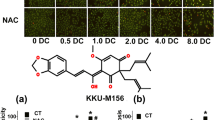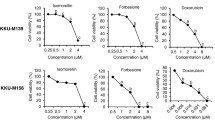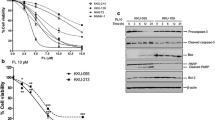Abstract
Cholangiocarcinoma (CCA) is a relatively rare, heterogeneous malignant tumor with poor clinical outcomes. Because of high insensitivity to chemotherapy and radiotherapy, there are no effective treatment options. Efforts to identify and develop new agents for prevention and treatment of this deadly disease are urgent. Here, we assessed the apoptotic cytotoxicity of Resina Draconis extract (RDE) using in vitro and in vivo assays and identified the mechanisms underlying antitumor effects of RDE. RDE was obtained via vacuum distillation of Resina Draconis with 75 % ethanol. The ethanol extract could inhibit CCA cell proliferation and trigger apoptotic cell death in both QBC939 and HCCC9810 cell lines in a time- and concentration-dependent manner. RDE treatment resulted in intracellular caspase-8 and poly (ADP-ribose) polymerase protease activation. RDE significantly downregulated antiapoptotic protein survivin expression and upregulated proapoptotic protein Bak expression. RDE also inhibited CCA tumor growth in vivo. We observed that human CCA tissues had much higher survivin expression than did paired adjacent normal tissue. Taken together, the current data suggested that RDE has anticancer effects on CCA, and that RDE could function as a novel anticancer agent to benefit patients with CCA.






Similar content being viewed by others
References
Shen H, Laird PW. Interplay between the cancer genome and epigenome. Cell. 2013;153:38–55.
Lubezky N, Facciuto M, Harimoto N, Schwartz ME, Florman SS. Surgical treatment of intrahepatic cholangiocarcinoma in the USA. J Hepatobiliary Pancreat Sci. 2015;22:124–30.
Bartella I, Dufour JF. Clinical diagnosis and staging of intrahepatic cholangiocarcinoma. J Gastrointestin Liver Dis. 2015;24:481–9.
Ruzzenente A, Conci S, Valdegamberi A, Pedrazzani C, Guglielmi A. Role of surgery in the treatment of intrahepatic cholangiocarcinoma. Eur Rev Med Pharmacol Sci. 2015;19:2892–900.
Zhu AX. Future directions in the treatment of cholangiocarcinoma. Best Pract Res Clin Gastroenterol. 2015;29:355–61.
Lalaoui N, Lindqvist LM, Sandow JJ, Ekert PG. The molecular relationships between apoptosis, autophagy and necroptosis. Semin Cell Dev Biol. 2015;39:63–9.
Fulda S. Targeting apoptosis for anticancer therapy. Semin Cancer Biol. 2015;31:84–8.
Alsanad SM, Williamson EM, Howard RL. Cancer patients at risk of herb/food supplement-drug interactions: a systematic review. Phytother Res. 2014;28:1749–55.
Yeung KS, Gubili J. Clinical guide to herb-drug interactions in oncology. J Soc Integr Oncol. 2007;5:113–7.
Xu W, Debeb BG, Lacerda L, Li J, Woodward WA. Tetrandrine, a compound common in Chinese traditional medicine, preferentially kills breast cancer tumor initiating cells (TICs) in vitro. Cancers (Basel). 2011;3:2274–85.
Jang SY, Hong D, Jeong SY, Kim JH. Shikonin causes apoptosis by up-regulating p73 and down-regulating ICBP90 in human cancer cells. Biochem Biophys Res Commun. 2015;465:71–6.
Ge L, Mao L, Tian JH, Shi FY, Lou L, Qiu X, et al. Network meta-analysis on selecting Chinese medical injections in radiotherapy for esophageal cancer. Zhongguo Zhong Yao Za Zhi. 2015;40:3674–81.
Xu J, Xiong T, Yang Y, Li J, Mao J. Resina Draconis as a topical treatment for pressure ulcers: a systematic review and meta-analysis. Wound Repair Regen. 2015;23:565–74.
Liu H, Lin S, Xiao D, Zheng X, Gu Y, Guo S. Evaluation of the wound healing potential of Resina Draconis (Dracaena cochinchinensis) in animal models. Evid Based Complement Alternat Med. 2013;2013:709865.
Lu H, Teng J, Wu H. A review on the study of Resina Draconis produced in China. Zhong Yao Cai. 2003;26:459–61.
Hu L, Xia L, Zhou H, Wu B, Mu Y, Wu Y, et al. TF/FVIIa/PAR2 promotes cell proliferation and migration via PKCalpha and ERK-dependent c-Jun/AP-1 pathway in colon cancer cell line SW620. Tumour Biol. 2013;34:2573–81.
Peng W, Hu J, Zhu XD, Liu X, Wang CC, Li WH, et al. Overexpression of miR-145 increases the sensitivity of vemurafenib in drug-resistant colo205 cell line. Tumour Biol. 2014;35:2983–8.
Shirali S, Aghaei M, Shabani M, Fathi M, Sohrabi M, Moeinifard M. Adenosine induces cell cycle arrest and apoptosis via cyclinD1/Cdk4 and Bcl-2/Bax pathways in human ovarian cancer cell line OVCAR-3. Tumour Biol. 2013;34:1085–95.
Li Y, Xiao W, Qin J, Guo Y, Zhu Q. Simultaneous determination of five active components in Resina Draconis and its extract by HPLC. Zhongguo Zhong Yao Za Zhi. 2012;37:929–33.
Cao Y, Gong W, Li N, Yin C, Wang Y. Comparison of microemulsion electrokinetic chromatography with high-performance liquid chromatography for fingerprint analysis of Resina Draconis. Anal Bioanal Chem. 2008;392:1003–10.
Powell CB, Fung P, Jackson J, Dall’Era J, Lewkowicz D, Cohen I, et al. Aqueous extract of herba Scutellaria barbatae, a Chinese herb used for ovarian cancer, induces apoptosis of ovarian cancer cell lines. Gynecol Oncol. 2003;91:332–40.
Zhong F, Yang J, Tong ZT, Chen LL, Fan LL, Wang F, et al. Guggulsterone inhibits human cholangiocarcinoma Sk-ChA-1 and Mz-ChA-1 cell growth by inducing caspase-dependent apoptosis and downregulation of survivin and Bcl-2 expression. Oncol Lett. 2015;10:1416–22.
Zhu ZB, Chen Y, Makhija SK, Lu B, Wang M, Rivera AA, et al. Survivin promoter-based conditionally replicative adenoviruses target cholangiocarcinoma. Int J Oncol. 2006;29:1319–29.
Ye CG, Chen GG, Ho RL, Merchant JL, He ML, Lai PB. Epigenetic upregulation of Bak by ZBP-89 inhibits the growth of hepatocellular carcinoma. Biochim Biophys Acta. 2013;1833:2970–9.
To AK, Chen GG, Chan UP, Ye C, Yun JP, Ho RL, et al. ZBP-89 enhances Bak expression and causes apoptosis in hepatocellular carcinoma cells. Biochim Biophys Acta. 1813;2011:222–30.
Acknowledgments
This work was financially supported, in part, by the National Natural Science Foundation of China no. 31371425 to X. Zhao and no. 31240025 to Z. Lu and the National Science and Technology Major Projects for Major New Drugs Innovation and Development of China 2012ZX09303015 to Q. Guo.
Author information
Authors and Affiliations
Corresponding authors
Ethics declarations
Conflicts of interest
None
Ethical standards
All the experiments involving in human specimens and animal were in accordance with protocols approved by the Ethical Committee for Human and Animal Experiments Guidelines on Animal Welfare of the China Medical University Shengjing Hospital (Shenyang, Liaoning, China).
Informed consent
Informed consent was obtained from all patients for being included in the study.
Additional information
Feng Wen and Xiangxuan Zhao contributed equally to this work.
Rights and permissions
About this article
Cite this article
Wen, F., Zhao, X., Zhao, Y. et al. The anticancer effects of Resina Draconis extract on cholangiocarcinoma. Tumor Biol. 37, 15203–15210 (2016). https://doi.org/10.1007/s13277-016-5393-3
Received:
Accepted:
Published:
Issue Date:
DOI: https://doi.org/10.1007/s13277-016-5393-3




